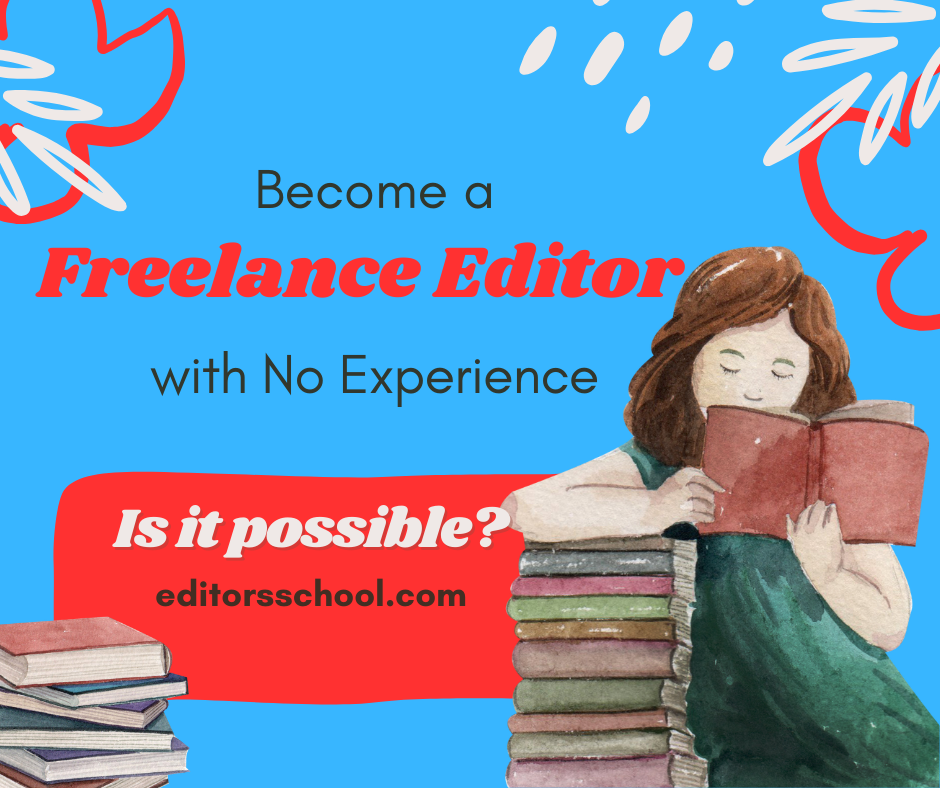How to Become a Freelance Editor with No Experience
- Editors School Admin
- 0
- Posted on

Wondering how to become a freelance editor with no experience? You’re in the right place. The editing world can seem like a secret club—full of style guides, jargon, and mysterious job boards. But the truth is, many successful editors started exactly where you are now: loving books, noticing typos, and wondering how to turn that into a career.
The good news? You don’t need a degree in publishing or years of experience to start building a real editing business. You just need to learn the skills, start practicing, and take small steps toward credibility. In this guide, we’ll walk you through how to get there, even if you’re starting from scratch.
Step 1: Learning the Fundamentals of Editing
You don’t need formal credentials to become a freelance editor—but you do need to know your stuff. The editing world runs on structure, clarity, and consistency, so a solid understanding of grammar, sentence rhythm, and publishing norms is essential.

Study the different types of editing: developmental, line, copyediting, and proofreading.
Understand common publishing style guides, especially The Chicago Manual of Style (Any link on this site may be an affiliate link).
Learn how voice, tone, structure, and clarity come together in strong writing.
Recommended books
Some beginner-friendly books we recommend include these (Amazon affiliate links):
- The Subversive Copy Editor by Carol Fisher Saller
- Self-Editing for Fiction Writers by Renni Browne and Dave King
- Developmental Editing by Scott Norton
Whether you’re learning solo or joining a course on how to become a freelance editor, keep this in mind: mastery builds over time.
Reading these foundational books will give you language, structure, and insight into what professional editors actually do and how you can do it, too.
Step 2: Practicing Your Skills Before Taking on Clients
Before you charge for your services, you should get hands-on experience. Practicing your editing skills helps you build confidence—and a future portfolio.
Where can you practice?
- Fanfiction or beta reading communities are great for testing developmental and line editing.
- Public domain books you can find at Project Gutenberg has classic material you may edit freely.
- Volunteer editing where you help writer friends, nonprofits, or online writing communities is another way.
You can also support your practice with tools like PerfectIt or proofreading programs that Dave Chesson mentions on Kindlepreneur.
Keep copies of your sample work and note what types of editing you enjoy most. This will help you later when you’re ready to start your business and begin charging for your work.

Step 3: Building Your Portfolio and Credibility
You don’t need a fancy resume to become a freelance editor. What you do need is a way to show what you can do.
Here’s how to create a beginner portfolio:
- Create sample edits using excerpts (with permission or work you’ve done on something from the public domain).
- When you’ve completed a sample, ask for a testimonial.
- Design a simple PDF showcasing your services and editing style.
Helpful tools:
- Canva Pro
- Kajabi
If you become a freelance editor with no experience, a portfolio communicates professionalism and makes it easier for clients to trust you with their work.
Step 4: Finding Freelance Editing Jobs
Once you have the skills and a few samples, it’s time to find your first clients.
Places to look:
- Reedsy: A curated platform for vetted editorial professionals
- Upwork and Fiverr: With extreme caution, filtering for serious projects and setting clear, flat rates
- Writing communities: Reddit, Facebook groups, and more
Pro tip: Indie authors are often overwhelmed and looking for trustworthy editors. If you want to become a freelance editor with no experience, don’t be afraid to reach out with a clear, respectful message and offer a sample of your work.
You can say something like this: “I’m building my freelance editing practice and would love to offer a free sample edit to see if we’re a good fit.”
You’re offering real value. Start with service and confidence.
Step 5: Treating It Like a Business (Even Early On)
One of the biggest mindset shifts most need to make is that freelance editing is an authentic job, not a passion project. If you don’t treat editing like a business, you do the rest of us a disservice.
Start strong:
- Price per project or per word, never per hour. Hourly rates penalize efficient editors and confuse clients. Flat fees = clarity and fairness for all.
- Use contracts to define scope, deadlines, and payment terms.
- Track your time (for your own information, not for charging clients), income, and expenses using tools like -Wave Accounting- or -Bonsai-
You don’t need everything to be perfect or to be in place all at once. Just be consistent and professional. Systems make success sustainable.
What You’ll Need to Succeed Long-Term

There’s no single path to success, but here are the elements most thriving editors have in place:
- Solid editing fundamentals
- Clear service offerings and pricing
- A simple, professional online presence
- A network or community to lean on
- Templates and tools to save time (onboarding forms, client emails, checklists)
You can build these resources yourself—or speed up the process with expert guidance. Either way, your progress multiplies when you focus on what matters and stop overthinking the rest.
TL;DR:
You can become a freelance editor with no experience if you learn the fundamentals, practice intentionally, build a small portfolio, and approach it like a real business. With the right mindset, tools, and support, this career is absolutely within reach for you.
Call to Action

Want to become a freelance editor with no experience, without endless googling, trial-and-error attempts, or imposter syndrome? Take a look at Editors School. It offers the roadmap, skills training, and real-world templates you need to launch with confidence.